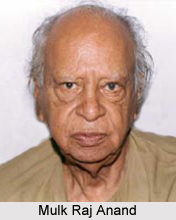 `The Untouchable` by Mulk Raj Anand deals with an issue that still poses as a problem in contemporary India. This book was published in the year 1935. This novel placed Anand among the leading Indian English authors. It is said that the inspiration of the book was the experience of author`s aunt. The impact of the book lies in its story telling and as emphasised by Forster that it affects the reader because the author had a clear understanding of the problem as he himself is an Indian. Mulk Raj Anand was a prominent writer of the country. From 1948 to 1966 Mulk Raj Anand taught at different universities of India. He was the visiting professor at the Institute of Advanced Studies in Shimla and became the chairman at Lalit Kala Akademi or National Academy of Arts.
`The Untouchable` by Mulk Raj Anand deals with an issue that still poses as a problem in contemporary India. This book was published in the year 1935. This novel placed Anand among the leading Indian English authors. It is said that the inspiration of the book was the experience of author`s aunt. The impact of the book lies in its story telling and as emphasised by Forster that it affects the reader because the author had a clear understanding of the problem as he himself is an Indian. Mulk Raj Anand was a prominent writer of the country. From 1948 to 1966 Mulk Raj Anand taught at different universities of India. He was the visiting professor at the Institute of Advanced Studies in Shimla and became the chairman at Lalit Kala Akademi or National Academy of Arts.
Synopsis of `The Untouchable`
`The Untouchable` narrates a day in the life of Bakha who is an outcaste. His sufferings and a number of humiliations in the course of his day is narrated in details. Yet the language that the writer adapts is a lucid one. Bakha is of 18 years, proud, strong and able-bodied, a child of modern India, who believes that he is superior as compared to his fellow-outcastes. However, due to his low birth, Bakha does the work of a sweeper. A particular incident occurs in the morning and afterwards shadows the rest of the day. The narration pours vitality, fire and richness in the story and that is why The Untouchable has become one of the remarkable creations of Mulk Raj Anand. The story of `The Untouchable` was inspired by the author`s childhood memories of a low-caste sweeper boy who carried him home after he suffered an injury. However, in return of his good work the boy was beaten by Anand`s mother for touching her son.
This novel faced a lot of controversies as he conveys precisely the matter of untouchables. The author displays compassion for the plight of untouchables but he does this without overdose of sentiments.













